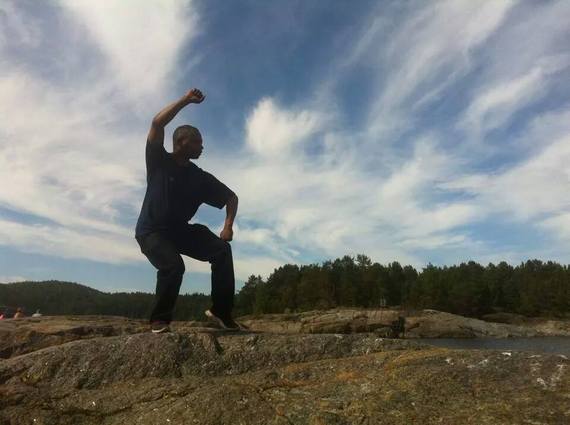What I learned this summer teaching tai chi to opera singers.
I just spent an inspiring two weeks in Härnösand, Sweden teaching Tai Chi to a group of opera singers at the Summer Opera Academy at Härnösand Folkhögskola. The program combined daily classes in vocal techniques and musical coaching with physical fitness and mental focus. And that's where tai chi comes in.
The art of tai chi and the art of singing share many things -- discipline, regular practice, and an emphasis on the breath. But, what may surprise you, as it did me, is that the breath, as a vehicle for directing energy to the singer's stage presence, was paramount in the success of any stage production.
The combination is not so strange, says Dr. Jean-Ronald LaFond, the program's director and founder of Kashu-do: The Way of the Singer. "The needs of tai chi and the needs of singing are so similar that we made it the nucleus of the program and worked around it." Mezzosoprano Gabriella Sborgi, Italian professional singer and teacher at the summer academy agrees: "It's not only about similarity, the fundamentals just correspond: flow, connection, energy, balance, being rooted, focused, inhabiting the body relating to the environment."
The results were nothing short of amazing.
The first two days were tough. "There was a lot of information for the students to absorb and when you spend so much time doing tai chi, your body starts to open and relax, and emotions come up," LaFond explained. After the students open up, they're vulnerable, and may feel terrible because they're facing a flood of emotions. That's when they see LaFond and they do tai chi. "We start to get the results of the fluidity of tai chi and how to use the breath as energy and the calm comes back as a result, as well as confidence."
"On day three, they all came with a sense of, 'here it is, what do you think?' It was phenomenal. From there, we can take it further, work with it, and develop it."
Regardless of what kind of singing you do, LaFond tells me that at the end of the day, singing is about breath management, as is, well, life.
Here, five reasons why singers should learn Tai Chi, and what it can do for you, too:
Link the breath with the body. When you are doing a tai chi exercise where breath and movement are tied together the idea of acting becomes a simple issue. It doesn't matter whether you're an actor, a dancer, opera singer, or pop star. "Singers are a particular kind of actor because singers have to continually emit breath while looking like they are moving on stage like natural people. That's a big challenge," says LaFond. When a performer's movements are tied to their breathing the whole thing becomes an experience. The audience becomes mesmerized by something that is synchronous.
Gain awareness of breath as energy. That's where singing comes from, says LaFond. It's an emission of energy that the performer is trained to control. "Think of the body as an instrument. We use our breath to deliver sound and the vitality of a character, says Sborgi. "I believe if the artist is able to use energy on stage, he not only becomes convincing, but powerful, and will also create harmony." After the program, she said the students had more attention of the body as a means of receiving and giving energy. And that energy is what helps convey the story to the audience.
Create a fluidity, or calm, of the breath. While singing, or speaking, you use the breath to engage the vocal chords to create a sound. Every time you finish a phrase, you have to ask, how tense are you? Are you able to renew the intake of breath until the next phrase without getting stuck? You're releasing the breath, but is there fluidity? Is there flexibility? Is there relaxation? "When you're singing with tension and you're tight at the end of the phrase, it takes an extra moment to relax and get the breath in," explains LaFond. "That ruins the phrasing, it ruins the musical ideas you may have, so this is something that can be absolutely phenomenal for singers of any kind."
Balance letting go with control. Tai chi helps performers be expansive while keeping their breath focused. "It sounds like a contradiction, but it's not," says Sborgi. "The more focused you are, the more you can radiate, she explains. "Our voice has to reach the furthest point possible, and this requires concentration."
Find your true voice. "Our voices are unique, like the color and the shape of our eyes," says Sborgi. "The more aware we are in terms of physical presence, balance and energy, the more our voice will be true, and singing will just feel good. That is an ultimate goal: To feel pleasure and wellbeing and convey that feeling to others.
A special thanks to the directors of the Summer Opera Academy, held at the university Härnösand Folkhögskola in Härnösand, Sweden: Helén Lundquist-Dahlén, head of the Kapellsberg Music Department and Karin Bengtsdotter-Olsson, voice pedagogue.
Much gratitude for an amazing two weeks of learning, growth, connection, music, opera, and Tai Chi. For more information about the program, and a glimpse of the training, please view the video Härnösand Summer Opera Academy 2014: Teamwork centered by Tai Chi.

